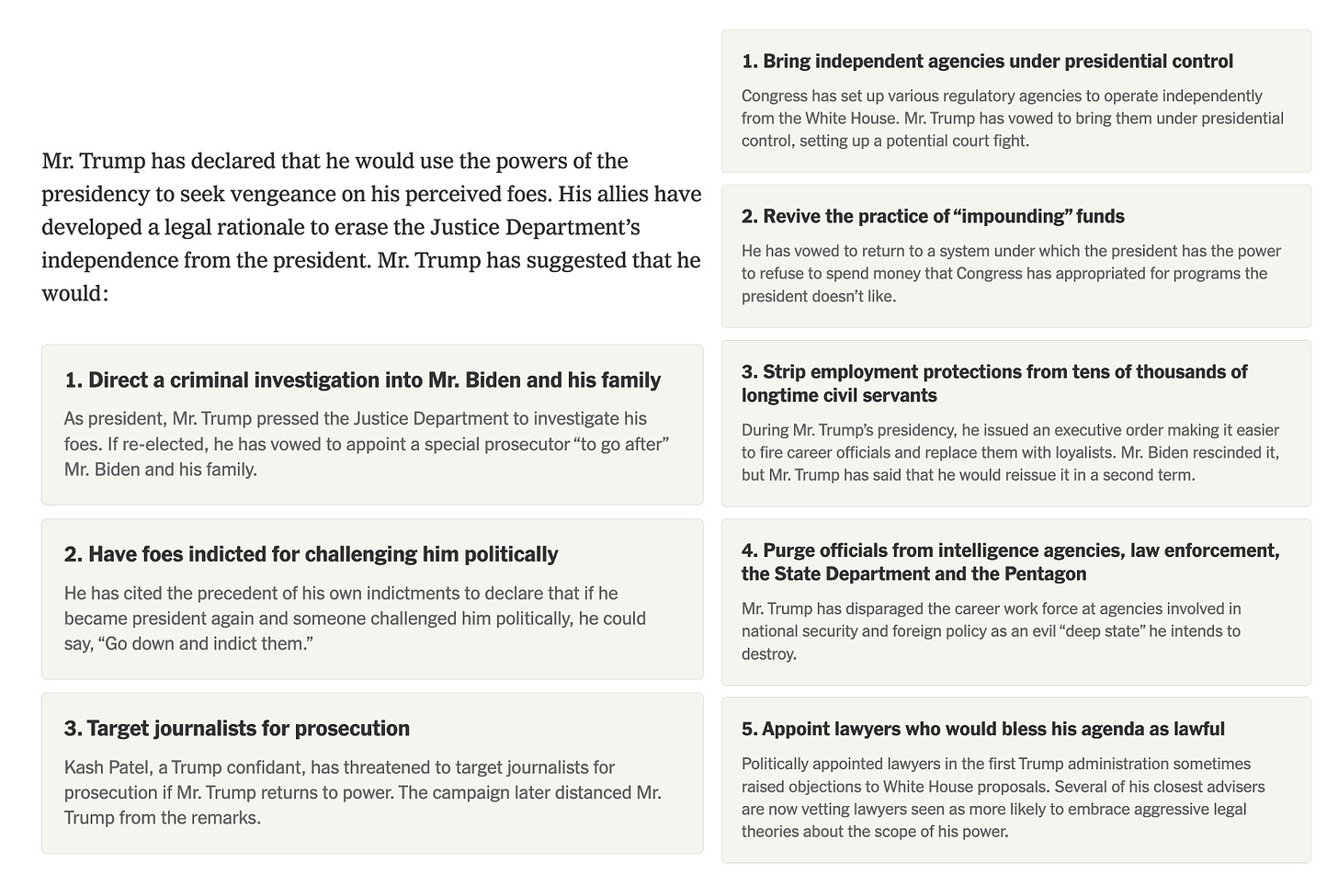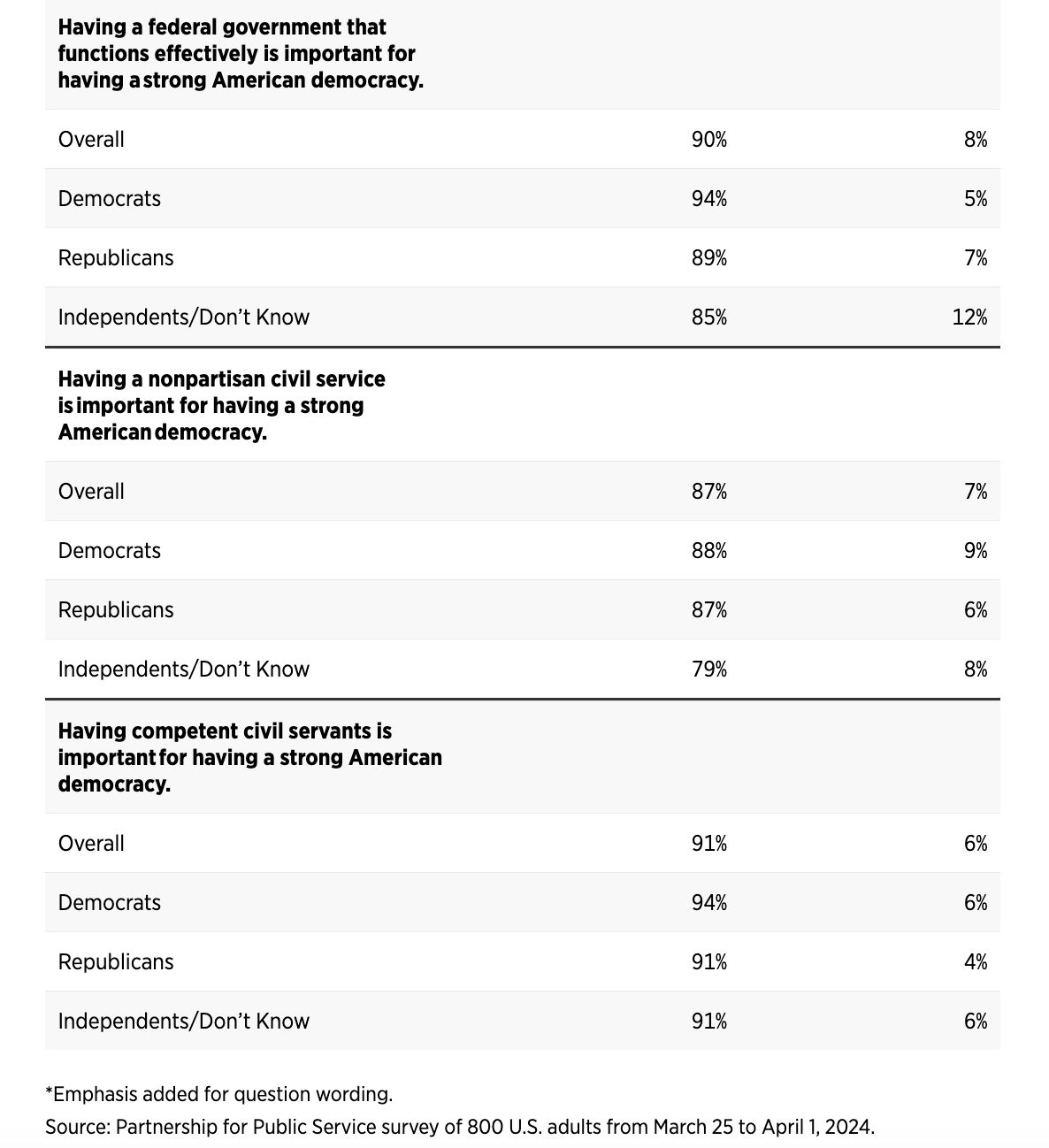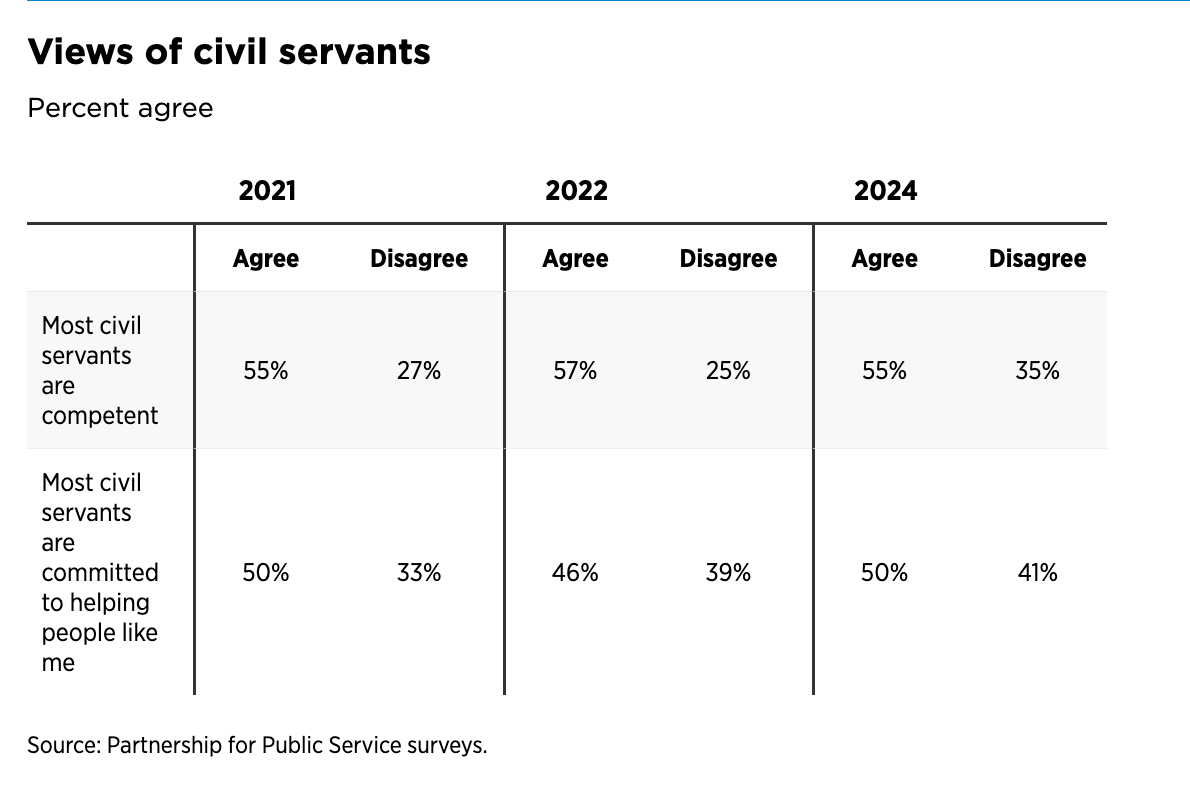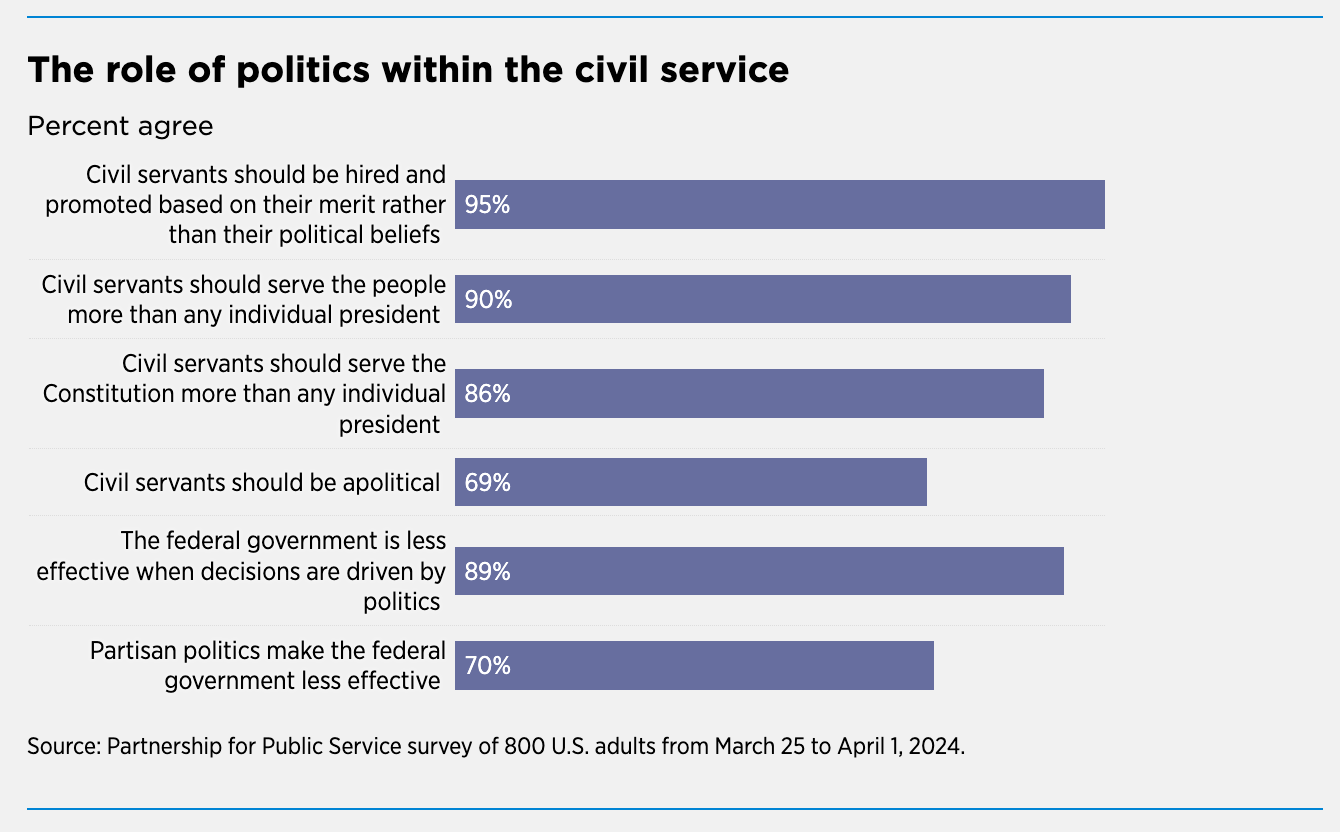The Public Opposes Trump's Plans to Politicize Public Services
And John Oliver provides a Project 2025 explainer for you to share
I’m a big fan of John Oliver’s Last Week Tonight for its skill in explaining complex policy topics in accessible ways. So I was excited to talk with a producer from the show about Schedule F, Trump’s plan to politicize the bureaucracy. For my money, Schedule F is the most important topic that the fewest number of people understand in the run-up to the next election. So having someone explain in a simple and engaging way is incredibly useful.
Please share with anyone you think might benefit from a deeper understanding of the threats that Schedule F poses, and the broader Project 2025 it has become embedded in.
Feel free to assume that I pitched the best jokes in this episode! (They did not, in fact, go with my suggestion that the Project 2025 team was was the AI response to the prompt “show me the most GOP staff ever”).
Explainers like Last Week Tonight are important because folks like me might be good at communicating to fellow wonks, but cannot reach the mass public. The NY Times also recently posted some simple summaries of what an actual Trump platform looks like, based on their excellent investigative reporting. It places Schedule F, using clear language, in a broader framework of a plan to centralize power in Trump’s hands, at the expense of Congress and almost everyone else.
New Poll Shows Overwhelming Supports for a Nonpartisan Civil Service
New polling suggests that once the public understands the stakes, they oppose Schedule F or other efforts at politicization. They trust politicians less as a class than they trust civil servants. In a national survey conducted by the Partnership for Public Service that offered a relatively grim picture overall — trust in government continues to decline — the public strongly defends a nonpartisan civil service, the value of competence, and the centrality of those criteria to a functioning democracy.
The support is strikingly bipartisan. Almost 9 in 10 Democrats and Republicans support a nonpartisan civil service. While trust in government is low, this is partly because the “government” is an abstract and bundled concept that reflects people’s broader sense of discontent with politics. By contrast, people are much more positive about specific services — the least popular agency, the IRS, is more favored than government as a whole — and civil servants, with the majority agreeing they are competent, and about half believing they are committed to helping the public.
I don’t doubt that if you change the question wording to play on partisan differences, the level of division would be greater. But that is sort of the point. Schedule F is not in response to a public demand. It is a partisan-led project that is seeking to create a justification for radical change that the public opposes, largely through conspiracy theories around the deep state.
The public is deeply opposed to the theory of governance behind Schedule F. They want a merit-based public sector responsive to the public more than any individual president. The Schedule F project is an anti-democratic one.
Lurching Toward a “Post-Constitutional” Government
Meanwhile Trumpworld officials claim to understand what the public wants, which happens to be that they should take more power with less accountability to pursue an authoritarian model of government. Oliver’s piece profiled Johnny McEntee, Trump’s bagman appointed to root out disloyalty. Back in 2021, I wrote:
what McEntee’s tenure shows is that Trump has found a means to satisfy his demands for loyalty that he lacked in 2020, and which he came to regard as essential to governing. His late term emphasis on political control of both the bureaucracy and his own appointees offers a glimpse of his Day 1 modus operandi for any second term.
Oliver also focused on the central role that Russ Vought has played in Project 2025. No official was more enthusiastic about using Schedule F than Vought. When he held the critical role of head of the Office of Management and Budget, he tried to reclassify the vast majority of employees to political appointee status, including clearly non-political roles such as IT specialists.
In his book Roadblocked, political scientist Heath Brown offered an account of one more way Schedule F can be used to derail democratic preferences. He details how the Vought stymied the Biden transition in 2020, leveraging the threat of Schedule F. Writing in BlueSky, Brown noted that: “For 75 years OMB experts helped incoming transition teams prepare an initial federal budget—in 2020 Vought blocked that. Vought used Schedule F to intimidate experts at OMB into not cooperating with the Biden-Harris transition team, many feared they’d be fired on the spot if they helped.”
Vought is now tipped for a major job in a second administration, such as Chief of Staff. He has a governmentwide vision of mass politicization. A recent profile in the Washington Post offered more insight into what he describes as a“post-constitutional” ethos.
What does “post-constitutional” mean? In short, it means breaking the law and claiming you were doing so because the other side was so radical. Vought engaged enabled illegal behavior at OMB, facilitating Trump’s illegal blockade of arms to Ukraine. He denied he did anything wrong, instead claiming that the people trying to uphold the law were the true dangers. That has been the ethos of Trumpworld since 2020. Vought mocked those concerned about lawbreaking in the first Trump administration: “A bunch of people around him who were constantly sitting on eggs and saying, ‘Oh my gosh, he’s getting me to violate the law.’” Vought pioneered the “weaponization” of government trope, which is premised on the false claim that government has become so radical that only extreme measures will suffice to correct it. Both the judgements on what constitutes the problem and the solution are driven by how Vought and his ilk view the world. Their ability to succeed depends upon their capacity to centralize and expand presidential power with tools like Schedule F.
A Bipartisan Group of Former National Security Officials Warn About the Risks of Schedule F
One of the challenges in writing about Schedule F is helping people understand how it would matter in their daily lives, which in turn means mapping how it would play out in different policy domains. For example, we should be really worried what happens if the funding of basic science research by the federal government becomes driven by political appointees who decide, for partisan reasons, that some universities cannot receive funds because they don’t like how students protest, or what faculty say. Or we should care about how Schedule F will make it easier to impose white Christian Nationalist values in the Department of Health and Human Services, such as using the Comstock Law to restrict abortion medication and other forms of birth control, and tracking women who do have abortions.
Another area we should worry about is national security. National security affects us all, and authoritarian regimes are distinguished from democratic ones by their desire to exert close control of national security services for partisan purposes. A bipartisan group of former national security officials, who themselves served as political appointees, wrote a letter describing Schedule F as a “significant risk” to national security:
Using potentially politics, no matter how well intentioned, as a litmus test for the appointment or retention of civil servants, senior and otherwise, presents too great a risk to our national and homeland security…In our decades of experience overseeing large, complex national security organizations under both Democratic and Republican Presidents, these individuals have always brought unrivalled technical expertise, institutional memory, and the ability to navigate complex bureaucracies that are truly priceless. Proposals that allow political loyalty to be substituted for merit in their ranks—even in the name of greater accountability—pose a significant risk.
What Happens Next?
We need Congress to act rather than allowing extremists fundamentally alter the system of checks and balances. That starts with Republicans.
Right now, Congressional inaction plays into Trump’s hands. This is why Republicans have done nothing to stop Schedule F despite efforts by Democrats. Maybe it is unrealistic to expect much before the election. But when those most familiar with the working of government, both Republicans and Democrats, keep reiterating that Schedule F would be a disaster, it is an act of gross negligence for Republicans to sit on their hands. If they come to the table, there are no shortage of options in addition to blocking Schedule F.
The national security officials and other bipartisan groups of bipartisan public management officials have made the point that there is a real need for modernization and no shortage of ideas to make government work better. Republicans can work with Democrats to build something. This will require Democrats being willing to make changes too, which may discomfort allies in public sector unions. But the long era of benign neglect is over. It is time either do something or to invite disaster.
If in the short run, we need the public to better understand the risks of politicization, and in the long run, we need more stories of success. I study and write about government a lot. And I’ve come to the conclusion that we focus on the negative way too much, to the point that it has made us vulnerable to destructive attacks that would make government worse. If you believe something is broken, why not take a sledgehammer to it?
That incessant bet of negative portrayals feeds negative views. With The Fifth Risk, Michael Lewis wrote one of the best books about how government officials actually perform extraordinary tasks that enable modern American society to function. The book stood out because, first, Lewis is a master storyteller, and second, because it told positive stories, while making clear how dangerous the no-nothing ethos of the Trump administration was to public service. When the results of the Partnership for Public Service survey was released, Lewis said: “It's very easy to cling to those stereotypes when you don't have actual personal interaction with the object of the bigotry or the stereotype. The minute you're in a foxhole with them, the minute you're in a basketball game with them, the minute you're just in a dinner with someone who you’ve been stereotyping, you realize, ‘Oh no. Stereotype wrong,’ or that it's just silly. And it's a stereotype we need to break.”








I agree with your article but, unfortunately, I don't have much hope about too many (or any) members of the Republican Party working with Democrats to pass legislation to stop Schedule F. They are too concerned with their own political positions and they're afraid of Trump. It's amazing to realize how many people who are afraid of their political leader think it's a good idea to go along with him, especially when it's proven that has no loyalty and will turn on anyone, for whatever reason.
Unrelated, but I wanted to tell you something I learned about at my job: the states send their public assistance rolls to HHS, which compares them looking for people enrolled in more than one state, and sends hits back to the states. The resulting report is called PARIS. For some reason the actual data work is done at the Department of Defense. But it's not going to be done this quarter, and we don't know when it will resume, because the agreement between HHS and DOD has expired and they haven't signed a new one. From the perspective of citizens, the federal government hasn't... signed an agreement... with itself?